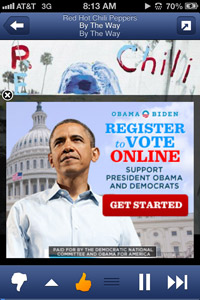Commentary
Political Ad Tracker: Online Spend Taps Data for Efficient Campaigns
- by Marge Pistulka , October 19, 2012
In previous Political Ad Trackers, we have analyzed why the Super PAC-fueled ad spend has not been as heavy online. But this doesn’t mean the 2012 elections have not had a significant online presence.
According to Borrell Associates, online spending for the 2012 elections will reach $160 million nationwide -- six times higher than 2008 elections.
From Preempted Schedules to Inventory Shutouts
Empower MediaMarketing’s political ad spend analysts are not seeing the same pressure on banner inventory pricing compared to local TV. But there are significant inventory limitations across sites like Hulu and Pandora as they sell out of prime space.
advertisement
advertisement

Political advertisers’ online investment taps into a rich stream of data that enables each campaign to microtarget.
Digital audio, for example, can target by geography, ZIP code and even IP address. This capability extends to video platforms as Google offers the ability to target by Congressional districts across its AdWords platform and YouTube.
And as more and more young voters go off the grid, Internet radio and video platforms may be the only way that certain constituents can be reached with paid media.
Paid, owned and earned media
Unlike broadcast and print, political ads are complemented by an extensive investment in owned and earned media online.
The 2012 election is the first of its kind in that it’s truly “social.” Regardless of party or the race in which they are engaged, we’re seeing candidates on all of the most popular sites, from Facebook, Twitter and YouTube to Tumblr, Instagram and Reddit, among others.

This gives voters unique access to the candidates and the ability to share their messages. It is driving more social conversation, and perhaps informing voters, but we’re seeing conflicting reports as to whether or not it is impacting voter opinion.
Does a Like Equal a Vote?
It is creating its own data stream, and many social media platforms are wondering whether earned media can predict who will win the election.
Facebook and Twitter have their own projects. And SEOVote.com taps search and social data to determine who will be in the White House after January 21st. These approaches can be interesting, but it has already seen that the correlation between the number of Twitter followers, Facebook likes and YouTube views does not necessarily correlate to the number of votes.
It’s in the Mix
Regardless of whether or not social activity converts to offline actions, it’s clear that the online spend benefits from the owned and earned activity it is generating. Twitter’s role in TV events -- the debates in particular -- is a powerful reminder of how a mix of online and offline tends to be the most powerful. A more holistic approach to the entire spend will allow for greater impact.


